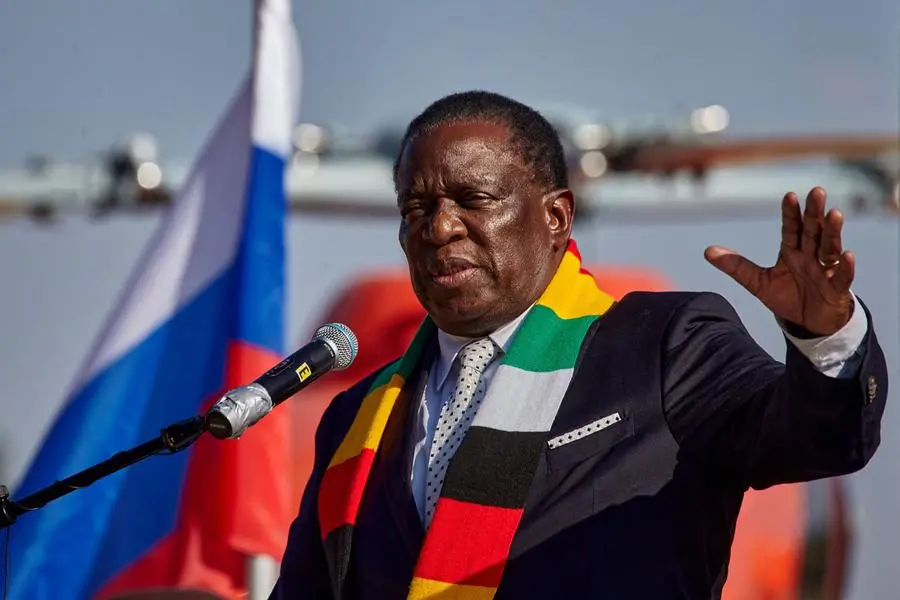PHOTO
Major international creditors are ratcheting up pressure on Zimbabwe, demanding that it speed up political and economic reforms to unlock a badly needed debt restructuring deal that has been under discussion for over two years.
African Development Bank (AfDB) president Akinwumi Adesina has been championing talks to help Zimbabwe reach an agreement with international creditors on a programme to clear its staggering $21 billion debt.
Debt has hindered Harare’s efforts to reset the economy after over two decades characterised by hyperinflation and currency crises.
Countries such as the United States have been cautious about the AfDB-led negotiations, because they feel that Zimbabwe under President Emmerson Mnangagwa is not moving fast enough on economic and political reforms.
The US, which quit the talks in early 2024 citing mounting political repression, this week returned to the negotiating table at the sixth high-level structured dialogue on Zimbabwe’s debt resolution process held in Harare.
Pamela Tremont, US ambassador to Zimbabwe, said that Washington saw outstanding reforms as the only path to clear the logjam on the debt crisis.“We are here to advocate the reforms that the international community has been asking for many years,” Tremont said. We are quite clear -- we need public officials to quit using their public offices for private gain. We need the judiciary to be able to deliver justice independently of political considerations.”She said the US also wanted “the rights to assembly and free speech to be fully respected” in Zimbabwe.
Ahead of the talks, the US embassy in Harare said it was not satisfied with the pace of reforms by President Mnangagwa’s administration.“There is only modest progress to note in the land reform or economic tracks,” the embassy said. “Despite this, our return to dialogue reflects our commitment to the Zimbabwean people and the need for genuine political will to advance reforms.”Former Mozambican president Joachim Chissano, who is an adviser for debt restructuring, said some of the reforms that Zimbabwe needed to urgently address had to do with “enhanced justice delivery, public sector transparency and accountability, combating corruption, promotion of human rights, electoral reforms and national unity.”Dr Adesina said Zimbabwe’s international isolation had dragged on for too long to the detriment of its economy.
He said some of the reforms that needed to be reviewed included a proposed law targeting non-governmental organisations that critics say is meant to close the democratic space and the compensation of white farmers who lost their land during a chaotic agrarian reform programme at the turn of the millennium.“Even wars never last this long,” Dr Adesina said. “It is clearly time to bring this to bring this to a close – end decades of untold damage to the economy of Zimbabwe.”“The $21 billion debt, of which the bulk is actually arrears has made arrears the new debt stacked like piles of sandbags on the back of Zimbabwe. We all agree we must play our part to correct this anomaly and give a new lease of live to this nation and its people so Zimbabwe can run again," the AfDB chief added.
He pointed out that 23 years of international isolation had “left Zimbabwe with a pile of debt,” -- $13 billion for external debt and $8 billion of domestic debt.
Harare has however, made progress with land tenure reforms to promote investor confidence, with a $35 million compensation package for more than 400 farmers that were affected by the land reforms spearheaded by former president the late Robert Mugabe.
President Mnangagwa’s government is also initiating reforms to give title deeds to beneficiaries of the land reform programme, which will allow them to access bank loans.
Zimbabwe started defaulting on international loans at the turn of the millennium and, a few years ago, started making token payments to 16 bilateral creditors.
Harare has not been able to access loans from the International Monetary Fund and the World Bank because of its inability to repay.
The Zimbabwe Coalition on Debt and Development (Zimcodd), a network of socioeconomic justice advocates, said the country’s debt crisis was worsened by the opaque nature of its foreign loans.
“Official debt statistics are often not transparently reported as the Treasury has reportedly shared varying debt stock with creditors, providing figures between $19.2 billion and $21.9 billion,” Zimcodd said.“This lack of transparency is a significant concern as it hampers the ability of economic agents and investors to accurately assess the state of public debt and make informed decisions - underlining the crucial need for transparent and reliable debt reporting.”Due to its isolation by the West and its failure to pay back loans to the Paris Club, Zimbabwe resorted to borrowing from China for infrastructure projects.
Its biggest Paris Club creditors are Germany, France, United Kingdom, Japan and the US, with a combined external debt stock amounting to $2.9 billion, which accounts for 74 percent of the Club’s external debt.
© Copyright 2022 Nation Media Group. All Rights Reserved. Provided by SyndiGate Media Inc. (Syndigate.info).





















